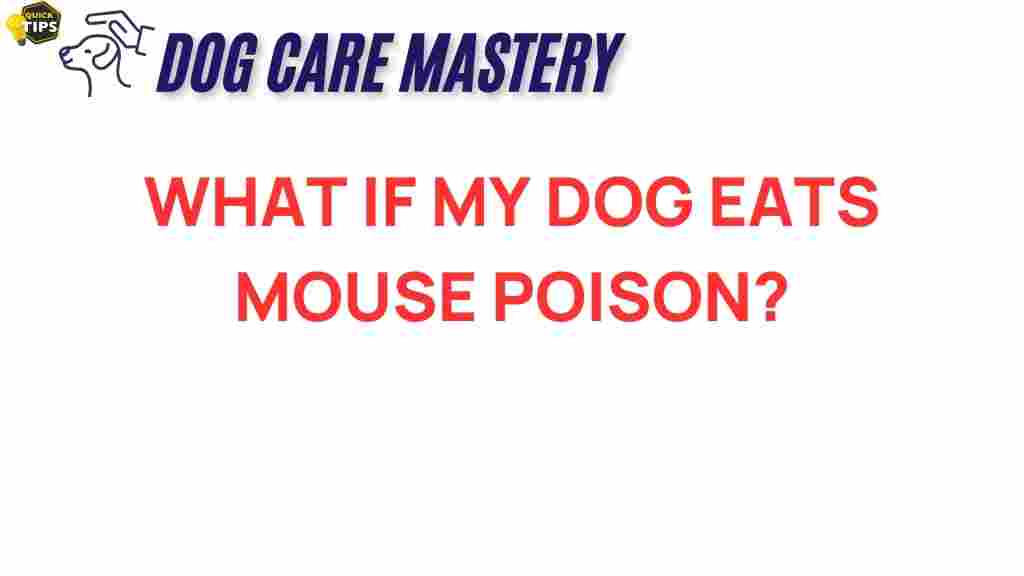The Alarming Consequences: What Happens If Your Dog Eats Mouse Poison?
As pet owners, we always strive to ensure our furry friends are safe and healthy. However, accidents can happen, and one of the most alarming situations is when dogs ingest mouse poison. Understanding the potential consequences of such an event is crucial for maintaining dog health. This article will delve into what mouse poison is, the symptoms to watch for, and the necessary steps to take if your dog consumes it.
Understanding Mouse Poison
Mouse poison, also known as rodenticide, is designed to eliminate rodents but can be extremely dangerous to pets, especially dogs. There are several types of mouse poisons, and they work in different ways:
- Anticoagulants: These are the most common type, which prevent blood from clotting, leading to internal bleeding.
- Neurotoxins: These affect the nervous system and can cause seizures, paralysis, or other severe neurological symptoms.
- Metabolic poisons: These cause organ failure by disrupting metabolic processes.
Regardless of the type, mouse poison poses significant risks to dog health and requires immediate attention if ingested.
Symptoms of Mouse Poison Ingestion
If you suspect that your dog has eaten mouse poison, it’s vital to be aware of the symptoms. Early detection can be critical for effective treatment. Common signs include:
- Vomiting: This may occur within hours of ingestion.
- Diarrhea: Some dogs may experience gastrointestinal upset.
- Weakness or lethargy: A sudden drop in energy levels may indicate poisoning.
- Difficulty breathing: Respiratory distress is a serious sign that requires immediate attention.
- Seizures: This is a sign of severe toxicity, especially with neurotoxic rodenticides.
- Unusual bleeding: This includes nosebleeds, bloody urine, or excessive bruising.
If you observe any of these symptoms, it is crucial not to wait. The faster you act, the better the chances of recovery for your dog.
What to Do If Your Dog Eats Mouse Poison
Here’s a step-by-step guide on what to do if you suspect your dog has ingested mouse poison:
Step 1: Assess the Situation
Determine if your dog has actually ingested mouse poison. Look for any remnants of the poison, such as packaging or bait. If you find any, note the type and amount, as this information will be helpful for your veterinarian.
Step 2: Contact Your Veterinarian
Do not wait for symptoms to appear. Call your vet or an emergency animal clinic immediately. Provide them with the following information:
- The type of poison (if known)
- The estimated amount ingested
- Your dog’s weight and age
- Any symptoms your dog is currently exhibiting
Step 3: Follow Your Vet’s Instructions
Your veterinarian may instruct you to bring your dog in for treatment or to induce vomiting at home, depending on the situation. Do not attempt to induce vomiting without professional guidance, as this can sometimes worsen the situation.
Step 4: Treatment Options
Once at the veterinary clinic, your dog may undergo several treatments, including:
- Activated Charcoal: This helps absorb the poison in the gastrointestinal tract.
- IV Fluids: To help with hydration and support kidney function.
- Vitamin K1: This is commonly administered for anticoagulant poisoning to help restore the body’s ability to clot blood.
- Medications: Depending on the type of poison, other medications may be needed to counteract the effects.
Preventing Mouse Poison Ingestion
Preventing your dog from accessing mouse poison is the best strategy for ensuring their dog health. Here are some effective measures:
- Store Poisons Safely: Keep all rodenticides in locked cabinets or high shelves out of your dog’s reach.
- Use Dog-Safe Alternatives: Consider using dog-friendly traps or deterrents for rodents.
- Monitor Your Dog: Supervise your dog during outdoor time, especially in areas where poisons may be used.
- Educate Others: Ensure all family members understand the dangers of rodenticides and how to handle them safely.
Troubleshooting Tips
If your dog has been exposed to mouse poison, you may feel overwhelmed. Here are some troubleshooting tips to help you navigate the situation:
- Stay Calm: Dogs can sense your anxiety. Keeping a level head will help you manage the situation better.
- Document Everything: Take notes on what your dog ingested, when it happened, and any symptoms observed. This information will assist your veterinarian.
- Follow-Up Care: After your dog receives treatment, follow your veterinarian’s recommendations for follow-up care to monitor recovery.
- Keep Emergency Contacts Handy: Have the numbers of your vet and local emergency clinics readily available for quick access.
Conclusion
Ingesting mouse poison can have serious consequences for your dog, impacting their overall dog health. Being proactive by understanding the risks and knowing how to respond can save your pet’s life. Always consult a veterinarian if you suspect your dog has ingested anything harmful, including mouse poison. Remember, prevention is key—take the necessary steps to keep your home safe for your furry friend. For more information on pet safety and health, check out resources from the American Kennel Club or your local veterinary clinic.
By staying informed and vigilant, you can protect your beloved pet from the dangers of mouse poison and ensure they lead a healthy, happy life.
This article is in the category Safety and created by dogcaremastery Team
